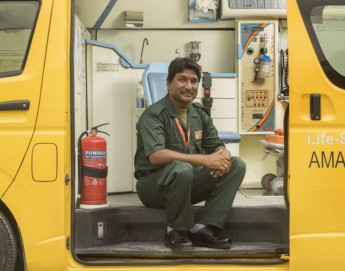
World First Aid Day: Pakistan first-aider says no one too young to save a life

Ikram Ullah's everyday choices are largely based on two convictions: no one is too young to save a life and timely first aid can be the difference between life and death. Ikram, now in his early 20s, has been volunteering with the Pakistan Red Crescent since 2016 and trains people to administer first aid in emergency situations.
A resident of Kurram district in Khyber Pakhtunkhwa (formerly North-West Frontier Province), he particularly likes working with school students because he believes that training children is a valuable investment for both the present and the future.

Ikram's convictions reflect this year's theme for World First Aid Day, which places children at the core of first-aid awareness and promotes teaching them life-saving techniques.
Observed on the second Saturday of September, the day marks the importance of having first-aid skills and the crucial role that National Red Cross and Red Crescent Societies and other organizations play in providing quality training across the world. This year's theme is "First aid at school."
The Pakistan Red Crescent initiated the first-aid training programme to popularize first-aid education across the country and the International Committee of the Red Cross (ICRC) began supporting it in 2000. The initiative grew into the wider-reaching Emergency Preparedness and Response Programme in 2012 for training students, police officers, journalists and public servants. The programme aimed to have "a first aider in every home".

With the help of partners like the Nepal Red Cross Society, Japanese Red Cross Society and British Red Cross, the programme has expanded across 46 districts since 2014. More than 340,000 people have been trained in the country and over 12,000 wounded and sick people have been given first aid.
The programme's success is hinged on the dedication of volunteers like Ikram who play a crucial role in training people across the country. Ikram shares that he was only a teenager living in a camp for internally displaced people (IDP) when he was introduced to the training programme.
There has been no turning back since. When the pandemic broke out, he took to TikTok and made videos to raise awareness of first aid, gathering a huge following both within the country and abroad in the process.

Talking about his experience with school students, Ikram recalls, "One day I was called to help transfer blast trauma victims to the hospital. Two students who had been part of my training had bunked school on the day and were near the blast site. They offered to help but I turned them down initially because I wanted to protect them. But seeing the need, they insisted and went on to help the injured people with great care. They may have been barely 16 years old but they did not back down from their duty as first responders."
He adds that imparting first-aid education in schools ensures that the youth are equipped with the right skills and attitude, which can make all the difference in an emergency situation.



